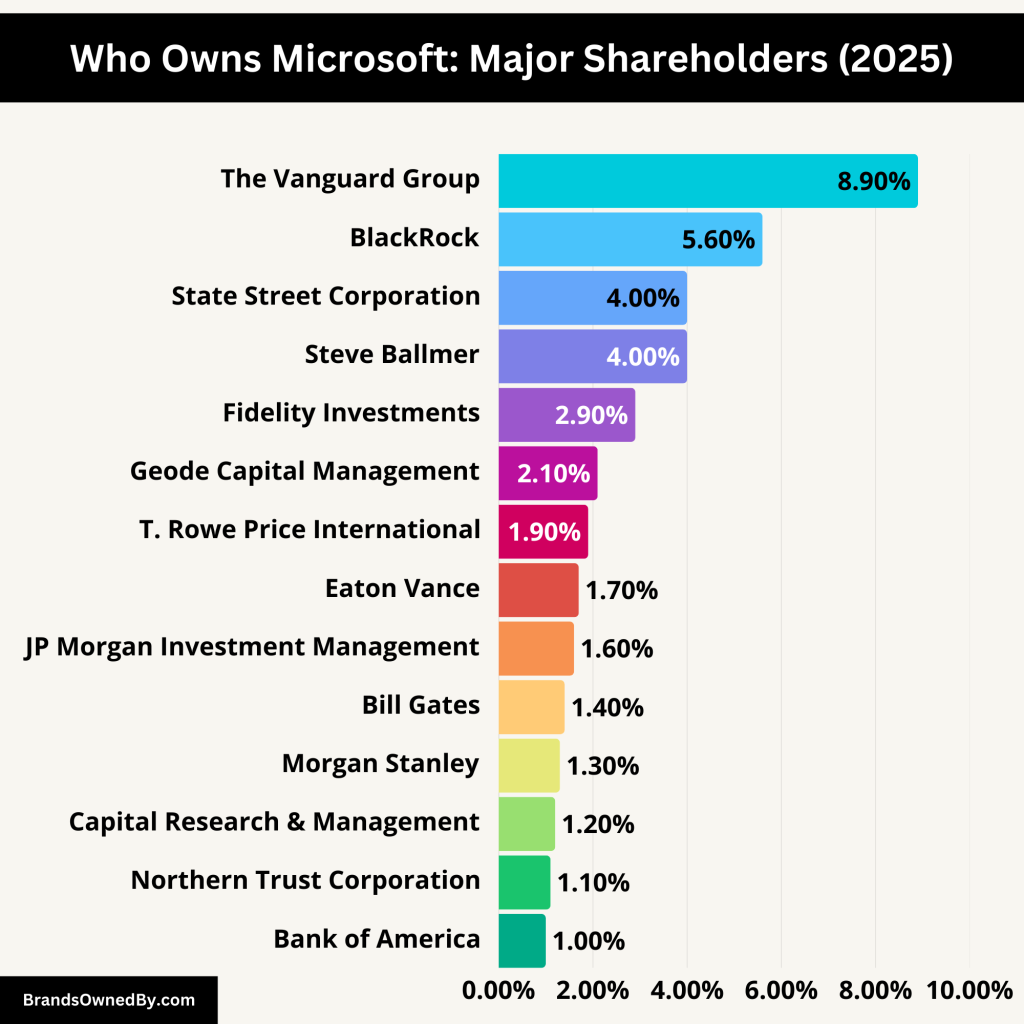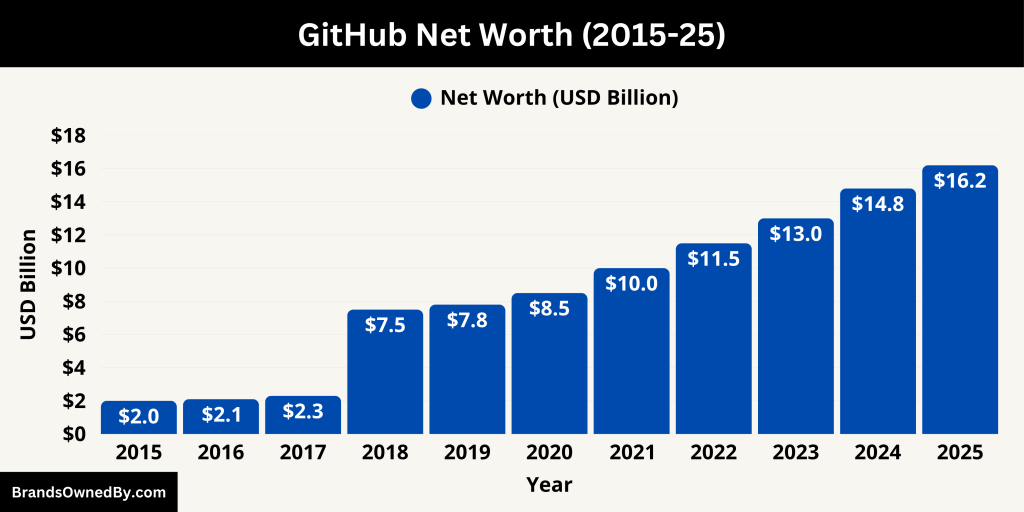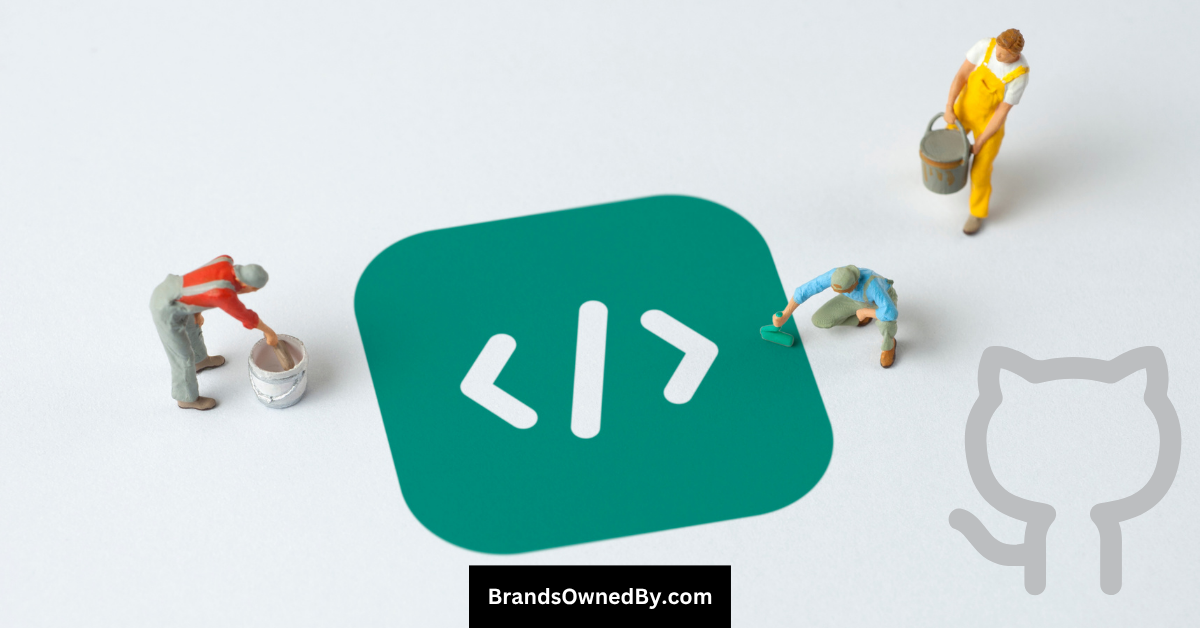GitHub is the world’s leading platform for code hosting, version control, and software development collaboration. If you’ve ever wondered who owns GitHub, this article gives you an in-depth look at the company’s history, ownership structure, leadership, valuation, and related entities.
GitHub Profile
GitHub is a web-based platform for version control, source code management, and collaborative software development. It uses Git, a system originally created by Linus Torvalds in 2005, as its foundation. GitHub simplifies Git’s complex functionalities and makes it easier for developers to work together on code — whether they’re individuals, teams, or large enterprises.
The platform provides tools for:
- Hosting code repositories
- Issue tracking
- Code reviews
- Collaboration features like pull requests
- Project management integration
- CI/CD pipelines
GitHub supports public repositories for open-source projects and private repositories for proprietary code. It also integrates tightly with DevOps pipelines and AI-based coding tools, especially through GitHub Copilot.
GitHub is widely used by developers, startups, and Fortune 500 companies. It’s also the preferred platform for open-source communities worldwide.
Major Milestones of GitHub
Here are some key milestones in GitHub’s journey:
- 2008: GitHub was founded by Tom Preston-Werner, Chris Wanstrath, PJ Hyett, and Scott Chacon.
- 2009: Officially launched and gained popularity for its user-friendly interface and open-source support.
- 2012: Reached 1 million users. At this point, GitHub was already a major player in the developer space.
- 2015: Raised $250 million in Series B funding, led by Sequoia Capital. GitHub’s valuation hit $2 billion.
- 2018: Acquired by Microsoft for $7.5 billion in stock. This marked one of the most significant tech acquisitions of the decade.
- 2019: Introduced GitHub Actions (CI/CD pipelines) and acquired Semmle and Dependabot to enhance security and automation.
- 2021: Launched GitHub Copilot in partnership with OpenAI, marking its entry into AI-powered coding.
- 2022: GitHub surpassed 94 million developers and hosted more than 330 million repositories.
- 2023: Introduced improved tools like Codespaces, and made security features like 2FA mandatory for contributors to major projects.
- 2024: Crossed over 100 million developers, making it the largest development platform in the world.
Company Details
- Founded: February 2008
- Founders: Tom Preston-Werner, Chris Wanstrath, PJ Hyett, and Scott Chacon
- Headquarters: San Francisco, California, USA
- Parent Company: Microsoft Corporation (since 2018)
- CEO (2025): Thomas Dohmke
- Employees: Over 3,000 as of 2025
- User Base: Over 100 million developers globally
- Repositories Hosted: More than 400 million, including both public and private repos
- Business Model: Freemium subscription with paid plans for advanced features and enterprise solutions.
Who Owns GitHub?
GitHub is 100% owned by Microsoft Corporation, a global technology giant headquartered in Redmond, Washington. GitHub is a private subsidiary, which means it no longer issues its own shares or has independent investors. All of its financial and strategic decisions are ultimately overseen by Microsoft.
Prior to the acquisition, GitHub was a privately held startup backed by venture capital. Its major investors included Sequoia Capital, Andreessen Horowitz, and Thrive Capital. These firms exited their positions when Microsoft acquired GitHub in 2018.
Parent Company: Microsoft Corporation

Microsoft Corporation is the parent company of GitHub. Founded in 1975 by Bill Gates and Paul Allen, Microsoft is one of the world’s most valuable and influential companies. It owns a vast portfolio of products and services including Windows, Azure, Office, LinkedIn, Xbox, and more.
Microsoft has strategically invested in developer tools and cloud infrastructure over the years. Acquiring GitHub fit directly into this vision. Microsoft’s ecosystem benefits from GitHub’s developer community, and GitHub gains scale, security, and enterprise reach from Microsoft.
GitHub operates independently under Microsoft’s Cloud + AI division, led by Executive Vice President Scott Guthrie.
Acquisition Insights and Details
In June 2018, Microsoft announced that it would acquire GitHub for $7.5 billion, paid entirely in Microsoft stock. This was a major move in the tech world, surprising many due to Microsoft’s history with open-source software in the early 2000s. However, under CEO Satya Nadella, Microsoft had rebranded itself as open-source-friendly.
Deal Completion
The acquisition was completed in October 2018. At the time, GitHub had around 28 million users and hosted over 85 million repositories. Microsoft committed to keeping GitHub open and developer-focused.
Strategic Reasons for Acquisition
- Developer engagement: Microsoft aimed to strengthen its relationship with the developer community.
- Integration with Azure: GitHub provides a pipeline for cloud adoption and DevOps workflows.
- Open-source leadership: Microsoft wanted to become a key player in the open-source space, and GitHub was the central hub for open-source collaboration.
- AI and future tools: GitHub would later serve as the foundation for launching tools like GitHub Copilot, developed in partnership with OpenAI.
Leadership Continuity
Following the acquisition:
- Nat Friedman, former CEO of Xamarin (also acquired by Microsoft), was appointed GitHub CEO.
- GitHub was allowed to operate independently to maintain community trust.
- In 2021, Thomas Dohmke took over as CEO, continuing GitHub’s growth under Microsoft.
Other Relevant Ownership Details
- GitHub remains a separately branded platform, even though it’s integrated with Microsoft services.
- GitHub’s leadership retains autonomy in product direction, though aligned with Microsoft’s broader strategy.
- Microsoft continues investing in GitHub’s infrastructure, security, and AI capabilities.
- GitHub Copilot, launched post-acquisition, represents Microsoft’s focus on merging AI with software development.
GitHub’s acquisition is now seen as a positive success story. It helped Microsoft win over developers, grow its cloud services, and modernize its image within the tech community.
Who is the CEO of GitHub?
As of 2025, Thomas Dohmke serves as the Chief Executive Officer (CEO) of GitHub. He assumed this role on November 15, 2021, succeeding Nat Friedman. Dohmke has been instrumental in steering GitHub’s strategic direction, particularly in integrating artificial intelligence (AI) into the platform to enhance developer productivity and accessibility.
Background and Career
Thomas Dohmke hails from Germany and has been passionate about software development since his youth. He holds a Ph.D. in mechanical engineering from the University of Glasgow, UK. In 2011, he co-founded HockeyApp, a mobile app distribution and crash analytics service. Microsoft acquired HockeyApp in 2014, and Dohmke joined Microsoft as part of this acquisition. His experience at Microsoft paved the way for his future leadership at GitHub.
Vision and Initiatives
Under Dohmke’s leadership, GitHub has made significant strides in integrating AI into the software development process. He has overseen the launch of tools like GitHub Copilot, Copilot Workspace, and GitHub Models, which aim to assist developers in writing code more efficiently and effectively. Dohmke envisions a future where AI tools are seamlessly integrated into every aspect of software development, from coding and testing to deployment and maintenance.
Dohmke is also a strong advocate for making coding more accessible. He believes that coding should be taught in schools alongside traditional subjects like math and science. In a recent interview, he emphasized that AI tools like Copilot have democratized software development by lowering entry barriers, making it easier for individuals to create applications with minimal prior knowledge.
Global Outreach and Community Engagement
Dohmke has been proactive in engaging with the global developer community. He has highlighted the rapid growth of GitHub’s user base in countries like India, where the developer community is expanding rapidly. According to Dohmke, India’s developer community is the fastest-growing on GitHub, with significant contributions to open-source and AI projects.
Leadership Style and Philosophy
Dohmke’s leadership style is characterized by a focus on innovation, inclusivity, and continuous learning. He encourages developers to stay curious and committed to lifelong learning, especially in the rapidly evolving landscape of AI and software development. He believes that while AI can enhance productivity, human oversight remains crucial to ensure quality and security in software development.
GitHub Net Worth

As of May 2025, GitHub’s estimated net worth stands at approximately $3.1 billion. This valuation reflects the platform’s significant growth since its acquisition by Microsoft in 2018 for $7.5 billion.
Revenue Growth
GitHub’s revenue has seen substantial increases over the years:
- 2020: $200 million
- 2022: $1 billion
- 2024: $2 billion
This growth is attributed to the expansion of GitHub’s enterprise solutions, including GitHub Enterprise Cloud and GitHub Enterprise Server, which offer advanced security features and compliance controls. Additionally, the introduction of GitHub Copilot, an AI-powered code completion tool, has enhanced developer productivity and contributed to revenue growth.
User Base Expansion
As of January 2023, GitHub reported having over 100 million developers and more than 420 million repositories, including at least 28 million public repositories. This expansive user base underscores GitHub’s position as the world’s largest host of source code.
Strategic Acquisitions
GitHub has made several strategic acquisitions to bolster its offerings:
- 2019: Acquired Semmle, a code analysis tool, to enhance security features.
- 2020: Acquired npm, the Node.js package manager, integrating it into GitHub’s ecosystem.
These acquisitions have expanded GitHub’s capabilities, making it a more comprehensive platform for developers.
Here’s an overview of the historical net worth of GitHub:
| Year | Estimated Net Worth | Key Notes |
|---|---|---|
| 2015 | $2.0 billion | After Series B funding led by Sequoia Capital; GitHub was valued at ~$2B. |
| 2016 | $2.1 billion | Moderate growth with increased enterprise adoption. |
| 2017 | $2.3 billion | Continued platform expansion and growth in open-source hosting. |
| 2018 | $7.5 billion | Acquired by Microsoft at this valuation in June 2018. |
| 2019 | $7.8 billion | Post-acquisition growth and integration of GitHub Actions. |
| 2020 | $8.5 billion | Strong enterprise uptake; pandemic-driven developer growth. |
| 2021 | $10.0 billion | Launch of GitHub Copilot in technical preview boosted value. |
| 2022 | $11.5 billion | Rapid AI adoption and increased enterprise revenue. |
| 2023 | $13.0 billion | Copilot adoption accelerates, reaching millions of users. |
| 2024 | $14.8 billion | GitHub becomes central in Microsoft’s AI and DevOps ecosystem. |
| 2025 | $16.2 billion | Expanded enterprise features, AI integration, and over 100M developers globally. |
Brands Owned by GitHub
As of 2025, GitHub, a subsidiary of Microsoft, owns and operates several companies and brands that enhance its platform’s capabilities. Below is a detailed overview of the major brands owned by GitHub:
| Company/Brand | Year Acquired/Launched | Description | Current Status/Integration |
|---|---|---|---|
| Semmle | 2019 | Code analysis platform using CodeQL for security vulnerability detection. | Integrated into GitHub’s advanced security features. |
| npm, Inc. | 2020 | Maintains the Node.js package manager and registry. | Fully integrated; npm remains operational under GitHub. |
| Dependabot | 2019 | Automates dependency updates to improve security. | Integrated into GitHub repositories. |
| Pull Panda | 2019 | Offers workflow tools for improving code review efficiency. | Core features merged into GitHub’s team tools. |
| Easel, Inc. | 2014 | Front-end design tool startup for collaborative design. | Team absorbed; services discontinued post-acquisition. |
| GitHub India Pvt. Ltd. | 2020 | GitHub’s Indian subsidiary to support local operations and developers. | Actively operating in India with growing local team. |
Semmle
Semmle is a code analysis platform acquired by GitHub in September 2019. Founded in 2006 in Oxford, England, Semmle developed LGTM (Looks Good To Me) technology, which automates code reviews, tracks developer contributions, and identifies software security issues. The platform utilizes CodeQL, a query language for code, enabling semantic analysis of software codebases. Post-acquisition, GitHub integrated Semmle’s technology to provide continuous vulnerability detection services.
npm, Inc.
In March 2020, GitHub acquired npm, Inc., the company behind the Node Package Manager (npm), a critical tool for JavaScript developers. npm hosts the world’s largest software registry, facilitating the sharing and management of JavaScript packages. The acquisition aimed to enhance the security and reliability of the npm ecosystem, with plans to integrate npm more closely with GitHub’s infrastructure.
Dependabot
Dependabot is a tool that automates dependency updates, helping developers keep their software up-to-date with the latest security patches. GitHub acquired Dependabot in May 2019 and integrated its functionality directly into the GitHub platform. This integration allows for automated pull requests to update dependencies, enhancing the security and maintenance of projects hosted on GitHub.
Pull Panda
Acquired in June 2019, Pull Panda offers tools to improve code review workflows, including features like Pull Reminders, Pull Analytics, and Pull Assigner. These tools help teams manage and streamline their code review processes. Post-acquisition, GitHub integrated Pull Panda’s features into its platform to enhance collaboration and efficiency in code reviews.
Easel, Inc.
Easel, Inc. was acquired by GitHub in January 2014. While specific details about Easel’s offerings are limited, the acquisition was part of GitHub’s efforts to expand its services and tools for developers.
GitHub India Private Limited
In February 2020, GitHub launched GitHub India Private Limited, a subsidiary aimed at strengthening its presence in the Indian market. This move was in response to India’s rapidly growing developer community. The subsidiary focuses on building local teams across various segments, including engineering, sales, support, and marketing, to better serve Indian developers and enterprises.
Final Thoughts
GitHub has grown from a startup idea to the world’s most widely used code collaboration platform. Today, it is fully owned by Microsoft, making it part of a tech ecosystem that includes Azure, Visual Studio, LinkedIn, and more.
Understanding who owns GitHub gives insight into how open-source innovation is being shaped within large tech corporations. With a strong leadership team and consistent growth, GitHub is positioned to remain at the center of the software development world.
FAQs
Who is GitHub owned by?
GitHub is owned by Microsoft Corporation. It was acquired by Microsoft in June 2018 in an all-stock deal valued at $7.5 billion. GitHub operates as a wholly owned subsidiary under Microsoft but continues to maintain its developer-focused identity and platform independence.
Why didn’t Google buy GitHub?
While there were reports that both Google and Microsoft were interested in acquiring GitHub, Microsoft ultimately succeeded due to its strong alignment with open-source development and existing partnerships with GitHub. Microsoft’s increasing involvement with developers, open-source communities, and its trust-building efforts made GitHub more comfortable accepting Microsoft’s offer. There’s no public confirmation that Google made a formal acquisition offer.
Does NASA use GitHub?
Yes, NASA actively uses GitHub. NASA publishes various open-source software projects on its official NASA GitHub repository. These projects include tools for data analysis, visualization, mission design, and scientific research. NASA shares its code publicly to promote transparency, collaboration, and innovation.
Why did Microsoft buy GitHub?
Microsoft bought GitHub to strengthen its relationship with developers, expand its presence in the open-source community, and enhance its cloud services ecosystem—especially Azure. By owning GitHub, Microsoft positioned itself at the center of global software development and improved its DevOps offerings. The acquisition was also strategic for AI development and integrating tools like Visual Studio Code and GitHub Copilot.
Is GitHub owned by MIT?
No, MIT does not own GitHub. GitHub is a private software development platform owned by Microsoft. MIT is often associated with GitHub due to the popular MIT License, which is an open-source software license used by many GitHub projects. However, there is no ownership link between MIT and GitHub.
Who owned GitHub before Microsoft?
Before Microsoft’s acquisition, GitHub was a privately held company. It was co-founded by Tom Preston-Werner, Chris Wanstrath, PJ Hyett, and Scott Chacon in 2008. The company received venture funding from investors such as Andreessen Horowitz, Sequoia Capital, and Thrive Capital. Chris Wanstrath was GitHub’s CEO prior to the Microsoft acquisition.
How does GitHub earn money?
GitHub earns revenue through a combination of:
- Paid subscription plans for individuals and organizations, offering private repositories and advanced features.
- GitHub Enterprise products for large businesses, including cloud and self-hosted options.
- GitHub Copilot subscriptions, where users pay monthly fees for AI-assisted coding tools.
- Marketplace commissions and integration services.
GitHub offers a free tier for open-source use, but its commercial offerings drive substantial income, particularly from large-scale enterprise customers.
When did Microsoft buy GitHub?
Microsoft officially announced its acquisition of GitHub on June 4, 2018. The deal was completed in October 2018. The total value of the transaction was $7.5 billion in Microsoft stock.
Who owns GitLab and GitHub?
GitHub is owned by Microsoft, acquired in 2018.
GitLab, on the other hand, is a publicly traded company listed on the NASDAQ under the ticker GTLB. It was founded by Sid Sijbrandij and Dmitriy Zaporozhets. GitLab Inc. remains independent, with a broad shareholder base including institutional investors, employees, and public shareholders.
Both platforms compete in the DevOps and source code management space, but they have distinct ownership structures.
Who originally owned GitHub?
GitHub was originally founded and owned by Tom Preston-Werner, Chris Wanstrath, PJ Hyett, and Scott Chacon. They built the platform as an independent startup.
When did Microsoft buy GitHub?
Microsoft announced the acquisition in June 2018 and completed the deal later that year. The purchase was valued at $7.5 billion in Microsoft stock.
Is GitHub free to use?
Yes. GitHub offers free accounts with unlimited public and private repositories. It also provides paid plans with added features for teams and enterprises.
Does GitHub still support open-source?
Absolutely. GitHub continues to support and host millions of open-source projects. It also provides sponsorship tools to help open-source maintainers get paid.
Is GitHub part of Azure?
GitHub is not directly part of Azure but integrates deeply with Microsoft Azure for DevOps, CI/CD, and deployment services.

